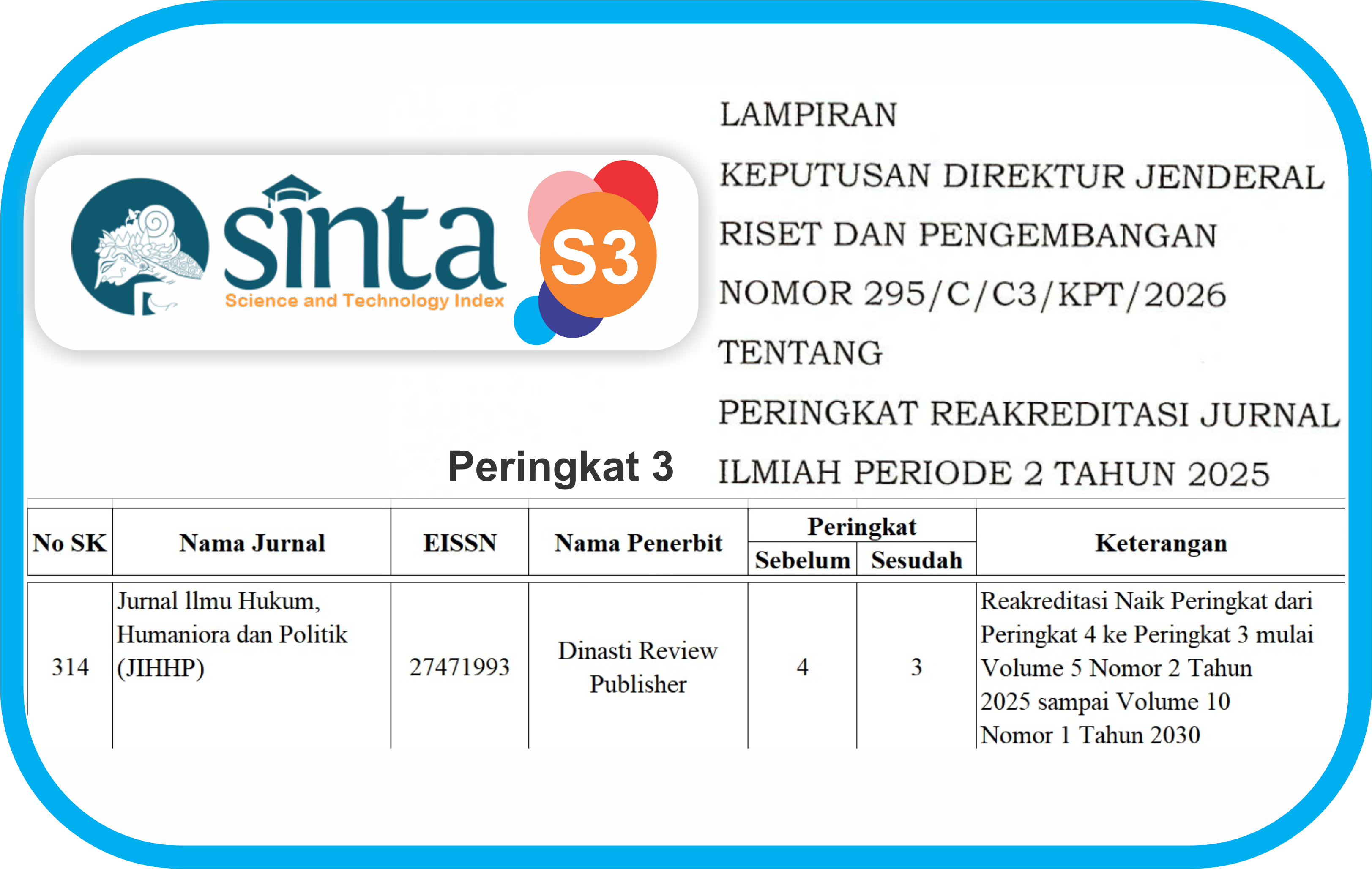Penerapan Restorative Justice oleh Pengadilan Negeri Medan untuk Mewujudkan Kepastian Hukum dalam Penyelesaian Tindak Pidana
DOI:
https://doi.org/10.38035/jihhp.v4i3.1961Keywords:
Restorative Justice, Legal Certainty, Criminal OffensesAbstract
This research aims to evaluate the effectiveness of the implementation of restorative justice by the District Court of Medan in achieving legal certainty for all parties involved in the legal process. The research method used is normative juridical legal research, focusing on written regulations and other legal materials. Data collection is conducted through literature review to explore concepts, theories, or opinions regarding Legal Certainty in the Implementation of Restorative Justice. The analysis is qualitative, explaining the relationship between types of data, selection, and data processing to be systematically outlined. The conclusion of the analysis will include answers to the issues raised and evidence of the truth or falsity of the hypotheses proposed. The results of the research indicate that the Indonesian Criminal Justice System has undergone renewal with the introduction of the concept of restorative justice. This involves perpetrators, victims, and other stakeholders in seeking fair solutions and peace after criminal events. The Public Prosecutor's Office plays a crucial role in prosecution, and the principle of "enn en ondeelbaar" asserts its functional unity. Restorative Justice has been regulated in laws and regulations, providing opportunities for victims and perpetrators to participate in peaceful case resolution. Restorative Justice offers an alternative to criminal case resolution outside the courtroom, focusing on restoration and reconciliation. In the District Attorney's Office of Medan, the process requires detailed administration. The regulation of victim protection in criminal law is stipulated in Indonesian positive law. Restorative Justice is applied in the general court environment with the aim of creating legal certainty and justice for all parties involved. Legal certainty in the application of Restorative Justice allows for various alternative handling of criminal offenses outside the courtroom, such as out-of-court settlements. This can reduce case backlog and high costs, as well as shorten the resolution process compared to litigation. Restorative Justice also prioritizes substantive justice with a focus on the interests of victims and restoring conditions to pre-criminal levels.References
Apong Herlina dkk, 2004, Perlindungan Terhadap Anak Yang Berhadapan Dengan Hukum, PT. Raja Grafindo Persada, Jakarta.
Dewi Ds dan A. Syukur Fatahilah, 2011, Mediasi Penal: Penerapan Restorative Justice di Pengadilan Anak Indonesia, Indie Publishing, Depok.
Erwin Asmadi, 2013, Pembuktian Tindak Pidana Teroris (Analisa Putusan Pengadilan Pada Kasus Perampokan Bank CIMB Niaga – Medan), PT. Sofmedia, Medan.
Ediwarman, 2010, Monograf Metode Penelitian Hukum (Panduan Penulisan Tesis Dan Disertasi), Medan,
Fajar Ari Sudewo, 2021, Pendekatan Restorative Justice Bagi Anak Yang Berhadapan Dengan Hukum. PT. Nasya Expanding Management, Pekalongan.
I Nyoman Putu Budiartha, 2012, Perlindungan Hukum Pekerja Outsourcing Ditinjau dari Prinsip Keadilan, Kepastian Hukum dan Hak Asasi Manusia, Disertasi, Bidang Ilmu Hukum Program Studi Doktor Ilmu Hukum Fakultas Hukum Universitas Brawijaya Malang, Malang.
Marlina, 2010, Pengantar Konsep Diversi dan Restorative Justice Dalam Hukum Pidana, USU Press, Medan.
Milles dan Hubberman, 1992, Analisis data kualitatif buku tentang sumber data-data baru, Univrsitas Indonesia press, Jakarta.
Muliadi, 1996, Kapita Selekta Sistem Peradilan Pidana, Badan Penerbit UNDIP, Semarang.
Peter Muhamad Marzuki, 2008, Pengantar Ilmu Hukum, Kencana Prenada Media Group, Jakarta.
R. Budi Wicaksono, 2008, Community Policing dan Restorative Justice Sebagai Paradigma Baru Dalam Resolusi Konflik. Tesis Fakultas Ilmu Sosial dan Ilmu Politik Departemen Kriminologi Program Pascasarjana Universitas Indonesia, Depok.
Romli Atmasasmita, 2007, Perlindungan Hak, Tersangka, Terdakwa, dan Korban Tindak Pidana Terorisme Dalam Sistem Peradilan Pidana Indoneisa, PT. Refika Aditama, Bandung.
Satjipto Rahardjo, 2009, Penegakan Hukum Suatu Tinjauan Sosiologis, Genta Publishing, Jogjakarta.
Tampil Anshari Siregar, 2005, Metodologi Penelitian Hukum, Pustaka Bangsa Press, Medan.
Downloads
Published
How to Cite
Issue
Section
License
Copyright (c) 2024 Nugraha Manuella Meliala, Ismaidar`, Muhammad Arif Sahlepi

This work is licensed under a Creative Commons Attribution 4.0 International License.
Hak cipta :
Penulis yang mempublikasikan manuskripnya di jurnal ini menyetujui ketentuan berikut:
- Hak cipta pada setiap artikel adalah milik penulis.
- Penulis mengakui bahwa Jurnal Ilmu Hukum, Humaniora dan Politik (JIHHP) berhak menjadi yang pertama menerbitkan dengan lisensi Creative Commons Attribution 4.0 International (Attribution 4.0 International CC BY 4.0) .
- Penulis dapat mengirimkan artikel secara terpisah, mengatur distribusi non-eksklusif manuskrip yang telah diterbitkan dalam jurnal ini ke versi lain (misalnya, dikirim ke repositori institusi penulis, publikasi ke dalam buku, dll.), dengan mengakui bahwa manuskrip telah diterbitkan pertama kali di JIHHP.















































